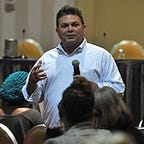Banning the Middle Class Syllabus
Speedchange.at.medium
I see it at the start of every school year, and frustratingly, most school administrators refuse to see it.
The middle class syllabus.
You’ve seen it, of course. It’s a document — often available only on non-accessible paper — that lists a succession of due dates and point scores, along with plenty of penalties. Oh yeah… and often insists that students buy stuff.
“Bring a three-ring binder (periwinkle) and something to write with to each class (pens with black or blue ink). Make sections for each book, grammar, poetry, and short stories.
□ All homework must be typed in Times New Roman, 11-point font, double-spaced, with .70 margins and proper headings (name, block, teacher’s name, title of assignment, and date in upper left corner). Single-spaced homework will not be accepted!
□ Bring only water to the classroom. We have cool, filtered water, but no containers, so you’ll want to keep a refillable cup or bottle in your locker.
□ Kindness counts. Students may not correct each other’s grammar, pronunciation, or ideas.”
Nothing blocks the possibility of true student voice like rules about ink color, typefaces, and notebook color. Nothing limits the opportunities of at-risk children like the enforcement of petty, meaningless, teacher preferences. And yet…
Grab every syllabus from your school this year and see what you see.
“I can’t quickly fix the fact that the majority of our teachers are white women,” a principal told me last week as she struggled with the success rate of African-American boys in her school. She spoke of how unconscious bias might be limiting success despite all her efforts. “I know that there are still neighborhoods where I lock my car doors,” she added, “is that a signal we’re sending?”
But before you get to unconscious bias you need to deal with the very conscious kind — the ‘my view of the world is the only right view’ kind of bias.
“Late work will not be accepted”
“Late work will be accepted but 20% of possible points will be forfeited for every day the assignment is late”
Or — in other words — kids from unstable homes need not apply. And — obviously — kids from homes with educated parents have built in advantage.
Teachers who create syllabi like this don’t see themselves as ultimately egocentric, but they are. The world, in their mind, revolves entirely around them and that which they prefer. Those students who prefer the same things — or who at least conform to those preferences — are “good” and thus “hard working” in an Angela Duckworth kind of way. Those with other preferences or needs are “not good,” and thus are “making poor choices.”
And those with other preferences and needs are most often Latino and African-American. Obviously, most often African-American. But they are also poor, or have Special Needs, or come from dysfunctional homes. They are the kids who actually need great teaching from great teachers, who need great schools that create opportunities they wouldn’t otherwise have, that need to not have administrators who tolerate staff that makes “studying while Black,” or “studying while Latino “ or “studying while dyslexic,” into crimes.
So if you are a school administrator, or if you wish to be an activist teacher, or — yes, even if you wish to be an activist parent — you might begin by making the start of school this next year into something equitable. You might determine that the racist, classist, normalist “Middle Class Syllabus” needs to be eradicated. You might determine that all of your kids deserve to be treated reasonably and fairly. You especially might want to be sure that those “Middle Class Syllabi” vanish from your all-middle class classrooms — you know — AP and honors courses, so that you stop slamming those doors.
Equity in schools requires many changes — in time, in furniture, in technology, in discipline — but it also needs to start where our courses begin: with every syllabus.
- Ira Socol
